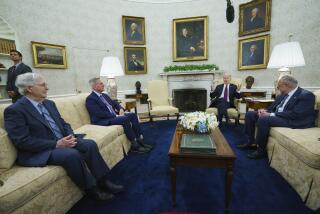Democrats See Promise in Big Spending Bills
- Share via
WASHINGTON — The nation’s economic woes have abruptly freed many Democrats in Congress to revert to old habits: Big spending is back.
A top Senate Democratic leader wants to spend $30 billion or more on roads, bridges and other job-creating infrastructure projects. Sen. Edward M. Kennedy (D-Mass.) is pushing as much as $31 billion to expand benefits for unemployed workers. And proposals to increase the minimum wage, which have languished for years, are gaining momentum in Democratic circles.
As Congress weighs an economic stimulus package to revive the American economy slowed by the Sept. 11 terrorist attacks, Republicans are generally arguing for a focus on tax cuts. But Democrats are increasingly looking to other approaches to get cash more quickly into the economy.
A meeting this morning between President Bush and a bipartisan cadre of congressional leaders is likely to shape the outlook.
Some Democrats remain wary of being portrayed as the big-spending, big-government advocates of yesteryear. That is why, for example, Democratic budget negotiators have asked Bush to put in writing any requests for additional appropriations Congress agrees to.
But in the evolving debate over how to stimulate the economy, many other Democrats are throwing political caution to the wind and proposing ambitious spending initiatives that would have been unthinkable just a month ago.
Indeed, Congress as a whole has already flung open the fiscal coffers in responding to the Sept. 11 attacks. It has given broad bipartisan approval to a $15-billion bailout for the ailing airline industry and $40 billion to help repair crash damage and mobilize an anti-terror response.
Now, as attention turns toward whether to pass another measure to boost the economy, Congress faces a basic question: If more stimulus is needed, is it better to increase government spending or to cut taxes to spur more spending by taxpayers?
Democrats have favored some tax cuts. They have generally rallied around the idea of providing another round of rebates or relief for people who pay only Medicare and Social Security payroll taxes.
But in recent days, Senate Democrats’ No. 2 leader, Harry Reid of Nevada, has been pushing on another front. He is urging his colleagues to back a big infusion of infrastructure spending.
Reid has proposed adding $5 billion for highway construction and upgrades, $5 billion for mass transit projects, $3.2 billion for Amtrak and $12 billion for high-speed rail--which would include a proposed Maglev rail line between Las Vegas and Orange County. He also wants to funnel more money into water projects, hospitals and power grids--to improve security against future terrorist attacks and to stimulate the economy.
“There’s no stimulus better than these job-intensive projects that need to be done anyway,” said Reid, who estimated that 42,000 jobs are created for every $1 billion spent on highway construction. Reid said he is not worried about being tagged a big-spending liberal because no such plan will be approved without bipartisan support.
Another initiative being floated by Kennedy focuses not on job creation but on helping workers who have lost their jobs. It includes money to expand and speed up unemployment insurance, subsidize health benefits for the unemployed, provide job training for displaced workers and help the jobless pay their energy bills.
That plan is even broader than the proposal, backed by House Minority Leader Richard A. Gephardt and other Democrats, to provide $3 billion in assistance to people who lost their jobs as a result of the financial collapse of the airline industry.
Kennedy and other Democrats have suggested that an increase in the minimum wage might also be included in any economic stimulus package. They say a $1.50 increase in the wage floor, which is now $5.15 an hour, would quickly put cash in the hands of people most likely to spend it. However, business groups have redoubled their opposition to a wage hike, saying a recession is the wrong time for Congress to increase employers’ payroll costs.
The National Restaurant Assn., in a recent letter to Bush and congressional leaders, called the idea “ludicrous.” Lee Culpepper, senior vice president of the restaurant association, said his group is even less willing to compromise on the issue than they were before Sept. 11, when they were willing to consider linking a minimum-wage hike to tax breaks for small businesses.
With leaders of both parties committed to making the economic stimulus initiative a bipartisan affair, aides generally predict that a minimum-wage hike--like the Republicans’ proposal to cut taxes on capital gains--will end up on the cutting room floor.
“The flagships of both parties won’t get through,” said a senior House Democratic aide.
Still, with workers all around the country losing their jobs in droves, Republicans may come under unusually heavy pressure to provide more relief for the unemployed.
“In this environment, there are things you would have thought impossible a month ago that now are within the realm of possibility,” said Gary Andres, a lobbyist who was on the White House congressional relations staff during Bush’s father’s administration. “There’s a lot of sensitivity on the part of this White House and Republican leadership in Congress not to . . . seem callous to the plight of working people and the economy.”
More to Read
Get the L.A. Times Politics newsletter
Deeply reported insights into legislation, politics and policy from Sacramento, Washington and beyond. In your inbox twice per week.
You may occasionally receive promotional content from the Los Angeles Times.











